#odin you absolute evil bastard
Photo
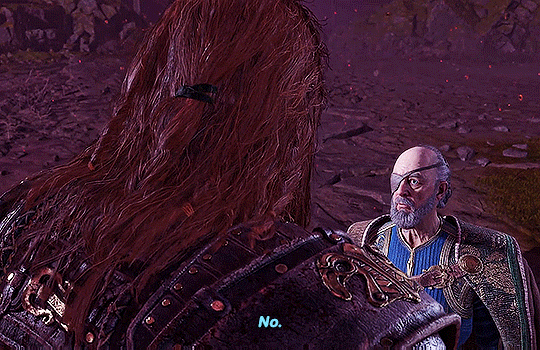
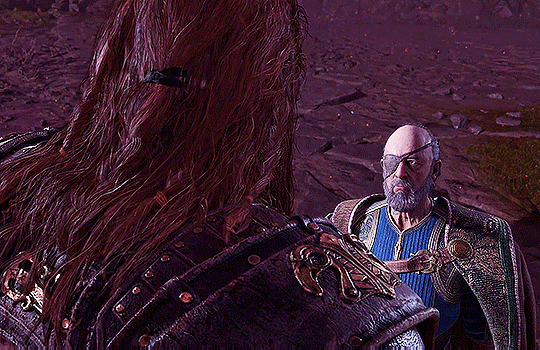
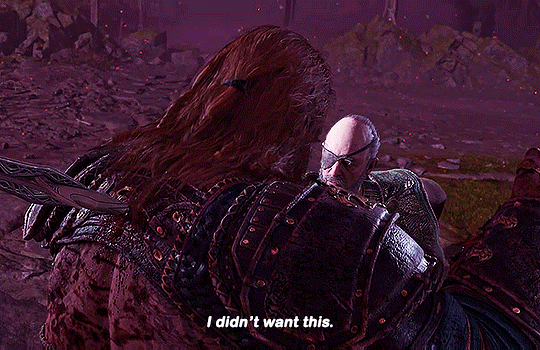

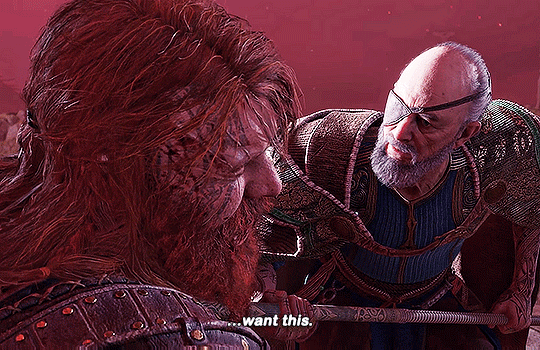
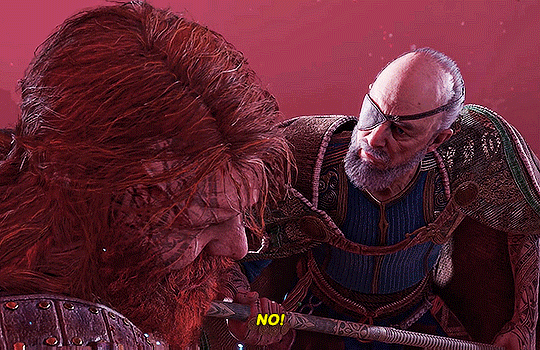
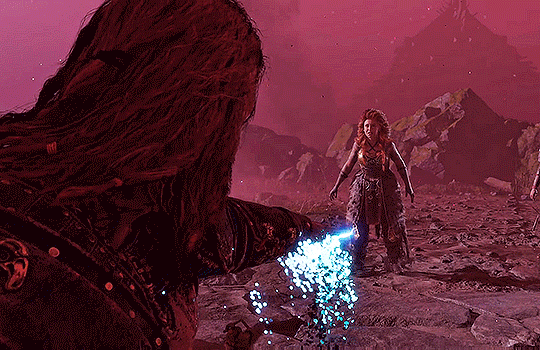
“Anyone can have a blind spot when it comes to family. Some only learn the truth in the hardest way.”
→ The Realms at War
#God of War: Ragnarok#god of war ragnarok#gamingedit#gowedit#videogameedit#gamingnetwork#gow thor#gow odin#gow thrud#Thor#Odin#Thrud#*mygowr#odin you absolute evil bastard#absolutely DEVASTATING turn of events#ryan hurst's thor is [chef's kiss]#he was amazing
68 notes
·
View notes
Text
So I haven’t been in this fandom for YEARS but I just came across smth that always bugged me so ig I’m venting.
So the fandom has always been very critical of Odin but I always found it to be to a fault. I’ll generally see very exaggerated, not canonically supported takes on Odin that paint everything he ever did in the worst light possible. To the point where it’s just extremely boring to me. Odin being pure evil is infinitely less interesting than him being gray flawed-but-loving parent. Now I realise a huge chunk of the fandom would love a ‘Loki realizes Odin will never love him and gets over him’ narrative but I find it 1) personally extremely emotionally unsatisfying 2) waaaaay beyond a story that could ever be handled well and with enough nuance by the mcu 3) a bit too not complaint with the first movie and in general with the framing in all of these movies to truly stick the landing.
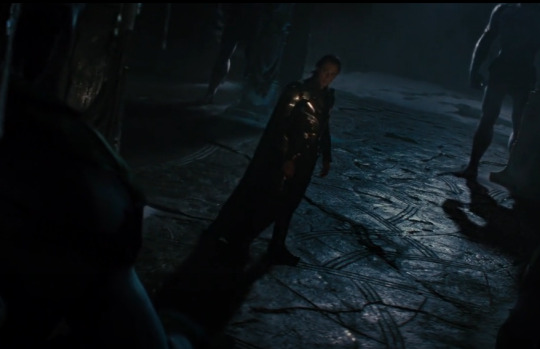
For example, ppl would often try to turn the information that was stated in canon that ‘Loki got adopted’ into ‘Loki got kidnapped’. The problem with that is that it’s solely based on headcanon. From a Watsonian perspective you can try to argue that Odin could be lying but from a Doylist perspective this is the only time we’re given information on that matter, and if the truth on such a crucial aspect of the story was different then it’d be extremely important to reveal the real truth to the audience at some point, but the writers never do that. Actually there’s a deleted scene found in the script where Loki reveals to Laufey that he’s his son, where Laufey explicitly agrees that he abandoned Loki, calls him weak and ‘a bastard son’. Now this is a deleted scene so it’s not canon, ig we could say it’s soft canon, but either way it gives us insight into the writers’ original intent behind writing the whole script including the vault scene and it presents the more fleshed out version of the story, where such a crucial information as Loki’s origin is indeed double-checked by Loki with the ‘original source’.
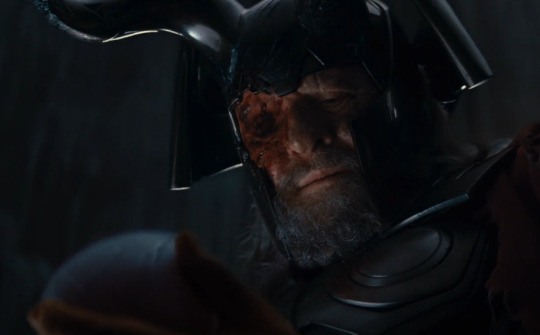
Next matter, the writers never thought through the story nearly as much as the fans do. The worldbuilding, history and lore of this world are next to non-existent. We don’t know anything about the Jotun culture, so who knows maybe leaving someone of royal blood in a temple was done for their own protection or maybe it was a sacrifice to their gods or smth, or maybe it has no meaning at all and he was simply left behind anywhere when others were fleeing. Similarly we don’t know anything about Asgardian customs so maybe the party at the end of the movie was smth disrespectful toward Loki’s recent presumed death or maybe it was exactly how they do it. We’re just left to either take the framing at face value even tho the framing is sometimes noticeably faulty or come up with headcanons.
And speaking of that party scene, along with weird assumptions about Asgardian culture I’ve also seen weird reading of Odin’s behavior. Now Anthony Hopkins clearly never cared about this role and in most scenes he barely even moves so I know that probs doesn’t help the perception that Odin the character doesn’t care about what’s happening around him, but we also do get some things out of him like this:
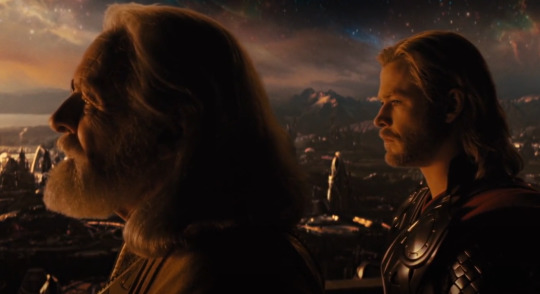
He's shown alone and isolated from the rest, staring blankly at the Bifrost where everybody thinks Loki died and it seems he can barely speak, but that somehow translates into ultimate proof that he’s happy/indifferent that Loki is gone, like ??? Absolutely bizarre takes. I would often see ppl scrutinize Odin’s behavior like this like they’re body language/human behavior “experts” or whatever, as tho it’s not the case that all the characters often appear to be underacting/underreacting when intercut with Loki’s drastic and often very realistic looking displays of emotion. And even with that in mind there’s always enough obvious cinematic language used in those scenes that you can clearly tell the authorial intent. Like you’d think somber music and sad faces and staying away from the party, in contrast to all the partying guests, would make it clear enough that Loki’s family is mourning. But ig they’re not mourning visibly enough for some ppl’s liking.
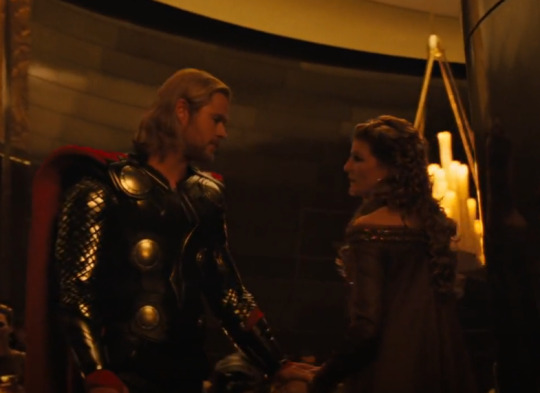
There’s more scenes like that that really convey the love between all the different family members, but then we also get these confusing scenes like ‘your birthright was to die’ or ‘am I not your mother’ or ‘That hope no longer exists to protect you. You betray me and I will kill you.’ that just kinda happen but then nothing ever gets explained or resolved. Unfortunately it’s likely the writers just think there’s nothing wrong with this kind of behavior and that the characters were justified/right in saying those things. So the fandom’s stuck not being able to just ignore the worst of it, and for me also not being able to ignore all the framing and writing that conveys real love within the family that I want to root for.
In broader strokes I would say the first movie is the most defining for the franchise and the characters and that’s the one that has me rooting for Odin and Loki’s relationship. Then came TDW and it was the real beginning of the end, not TR. This movie was the first that tried to simply sweep under the rug all the interesting drama the previous movies built. They find a way to get rid of Frigga, they get rid of Odin and rush his arc to its end (originally with no intention to bring him back ever again, according to interviews) and they also tried to get rid of Loki for good and rush his arc to its end. Leaving Thor free from having to deal with all the family drama ever again that ig powers that be decided no one wanted to see, until changes were made. With the third movie continuing to axe everything that’s left from the Thor franchise and continuing the task of writing out Thor’s family members, bringing Odin and Loki back, giving them both more flattering conclusions and then killing them off again. And what a pity cos the bones for great arcs for these characters are all there. If only there was a single cohesive vision for the franchise that allowed for continuous cohesive arcs throughout the trilogy.
Anyway, ig I still had some mourning to do for all that development that never happened and that at this point we’re way beyond ever getting.
#mcu#mcu salt#thor 2011#thor#loki#odin#frigga#odin allfather#frigga allmother#loki friggason#loki odinson#loki laufeyson#thor odinson#thor friggason#brodinsons#the odinsons#the odinsons meta#mcu fandom#odin meta
113 notes
·
View notes
Text
~Odin's Bastard~
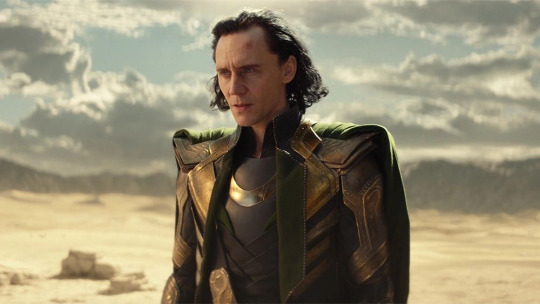
Masterlist
A/N: This one shot was requested by SashaWalker5 on AO3. Thank you for the request. ♥️♥️ Sorry it took so long and I hope you like it!
Prompt: "I'm here to take you home."
Summary: Loki finds out that after Hela was destroyed, another child of Odin had broken free and wandered around Midgard with no harm in mind whatsoever.
Timeline: After Ragnarok, however, Thanos doesn't show up and Asgard doesn't blow up either.
Pairing: This is strictly a brother/sister relationship and so it is a platonic relationship. Fem!Sibling!Reader.
Warning: None.
Not even days after the brothers' victory of defeating their evil sister, word of another child of Odin came out as they found their father's hidden books. One of the golden books mentioned a woman, Y/N, an unknown goddess who was bearing the last name Odinsdottir as well as her last known location on Midgard. Thor didn't want to poke the bear and cause a worse situation, but Loki knew what it felt like to be abandoned and cast out of the family so he insisted on seeing her and bringing her home.
During his journey to Midgard with the help of Heimdall, Loki read more of Odin's golden book. His father had written down an explanation about why he had evicted his youngest daughter.
Odin had a scandalous love affair during his marriage with Frigga. Feeling like he had to cover up his deeds, he forced his newborn's mother to disguise her child as a human and send her to Midgard.
'Poor girl', he thought and sighed, feeling the taxi he was in come to a halt.
He had loved to use any other type of transportation for this, but sadly he had to travel as most humans did. He had absolutely no idea where to find his so-called sister and neither did Heimdall for once so he had to find her the old way.... by looking through old phone books and their addresses.
"Sir, this is your stop." The exhausted man spoke and held up his trembling hand, waiting for the money to be placed into his palm.
"Thank you." He gave the man his money and got out, scanning the neighbourhood. "You surely won yourself some luxury in this terrible place." He mumbled, slightly jealous.
Apparently his sister was living in one of the biggest penthouses in New York, clearly living a rich and comfortable life. It was something Loki had wished to accomplish when he was younger, find a place that would accept and treat him well.
He got into the elevator and let himself inside, noticing she wasn't home yet.
~~~
"No, I don't want to deal with that bullshit again." Y/N hissed through the phone, grabbing her keys to unlock her door to her penthouse. "No. Are you even listening? Jesus, figure it out." She hung up and rolled her eyes, locking her door behind her.
She had a terrible day at work and felt like her workers were completely brainless.
"So, I...." Loki tried to speak up, but the woman held up her finger in a sassy way, turning to him as she cut him off.
"No. Nah-uh." She shook her head and threw her keys onto her counter. "Not in the mood for your games."
"My games?" Loki raised his brow, uncrossing his legs as he said up straight.
"Loki, god of trickery, frost giant. Yeah, I know who you are and I'm not in the mood to talk to you, brother." She watched him uninterested and took off her shoes. "I was fine without you all and tell the heartless old man to fuck off cause I ain't coming back to help him with his stupid little wars. He's the reason I'm living here in the first place."
"He's dead." Loki bluntly said and she looked up from taking off her shoes, dropping her second shoe to the floor by the surprise. "Odin is dead and I'm here to bring you home sister, but if you're okay with living a life like this then I'll let you rot on this useless planet." He shrugged, slowly getting up with the same impassive facial expression. "But don't feel regret because of your terrible half-witter decision."
"You're saying dear old dad is dead?" She blocked his way to get out of the apartment and he towered over her, showing a mischievous grin.
"My sister is suddenly burning with curiosity now I mentioned our expired father?" He laughed and grabbed her doorknob, shoving her to the side. "Too late."
Y/N froze his hand to the door and he watched her. "You're not the only frost giant." She shrugged with pride and crossed her arms.
"Half frost giant huh?" He smirked and broke free from the door, pretty impressed by his little sister.
"Yes, and it's never too late. Bring me home, Loki." She stared at him with a stern glare and he smiled, actually kinda liking her attitude cause he could see himself in her. "I changed my mind."
"Come on then little sister, Heimdall is waiting for us." He opened the door for her and she nodded, getting out so they could both finally return home through the bifrost. Home where he could teach his little sister everything about Jotunheim and perhaps even find out who her mother was.
He knew they didn't start off strong, but he also knew she would trust him sooner or later because he saw his younger self in her and he knew how she thought.
4 notes
·
View notes
Note
Character Opinion Bingo: Marcone
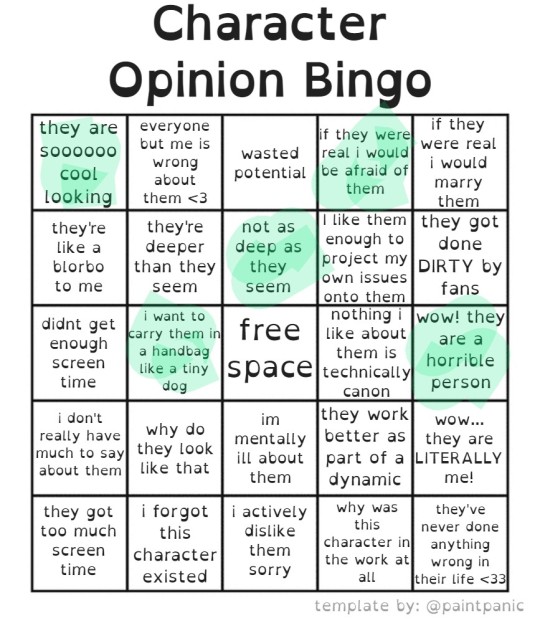
He's so cool looking - has amazing suits. I really hate the way the comics draw him, I prefer a slender, sleeker Marcone than a blocky one, but the Marcone in my head is 👌 and looks suspiciously like Frederick Chilton
If they were real I would be afraid of them - I'm afraid of him even though he isn't real tbh. He's one of those characters that, for all his suave charisma, you can't help but think about the Implications, which are actually quite hmm... problematique.
Not as deep as they seem - I have a bit of beef with coin!Marcone? Marcoin? in that I'm worried it reduces a stellar vanilla mortal into yet another supernatural being. I feel like the Mab/Marcone/Odin group is becoming kinda homogenous. Though maybe Butcher has something else up his sleeves that will give Marcone his edge back.
I want to carry them in a handbag like a tiny dog - a very classy and fashionable accessory who looks good but is ultimately tenacious af and kind of pure evil.
Wow! They are a horrible person - No matter how much "redemption" Marcone ever gets in canon, I'm gonna maintain that he's an absolute bastard.
12 notes
·
View notes
Text
Review of Romeo X Juliet (the anime adaption of Romeo and Juliet, VERY loosely based off of the original play)
Well I think it’s gonna be kinda long, so I’m gonna put a cut right here.
OK.
What it got right/ what was in there that was in the actual play:
Romeo and Juliet are from two opposing families (Montague and Capulet). They fall in love with each other. There are some other characters who also exist.
What was in there that was NOT in the actual play:
Literally everything and anything else. This is not an exaggeration in the least bit. Juliet grows wings at some point. And maybe turns into an actual tree.
So. What’s Romeo X Juliet about?
The basic Premise:
Montague (not the whole family- just Romeo’s father) is the main antagonist. He kills out the entire Capulet family when Juliet is a child, but somehow Juliet is rescued. Juliet spends the next like 13-14 year of her life pretending to be a boy by the name of Odin to hide from Montague, and also does vigilante work, because life isn’t so good under Montague’s rule. Oh yeah, Montague’s like. The king or something.
There are also characters from other Shakespeare plays there. And Shakespeare himself is a character.
The Characters:
Characters who aren’t from Romeo and Juliet (but are from other Shakespeare plays):
Shakespeare himself- he’s literally just Shakespeare himself. Just chilling, watching the whole plot go down.
Emilia- an actress in Shakespeare’s acting troupe
Regan- a servant girl working for Shakespeare’s mother’S family.
Cordelia- I think she’s like. A servant to the Capulet family? Who got away with Juliet when Montague killed them off? Anyway she’s Plot relevant. She marries Benvolio.
Ophelia- oh boy. Where do I even start. OK you know what? I’ll get to this when I get up to Escalus. Just. Scroll to where I talk about Escalus.
Petruchio- he’s pretty irrelevant- he only exists for one episode, and then he dies a tragic death
Hermione- the girl Romeo’s engaged to.
Characters that are actually from Romeo and Juliet:
(In the order of easiest to explain to hardest to explain)
Juliet- Ok. She’s the main character. She does vigilante work until she can’t anymore.
Romeo- literally just Romeo. Exactly what you’d expect from Romeo. He doesn’t do anything mind blowing. I mean, he does try to kill Montague, but everyone tries to kill Montague because he’s basically a dictator.
Lady Montague- I think she went off to become a nun or something, because she didn’t like that her husband was basically a dictator who goes around murdering people. She’s nice. I liked her.
Benvolio- not the brightest guy. Really. He and his family gets exiled because his father disagreed with something Montague said. Ends up marrying Cordelia.
Mercutio- one of the antagonists, but literally the worst one. He decides to betray Romeo and join Team Antagonists because I think he wanted power or something? It wasn’t entirely clear. He then betrays his father to Montague, and Montague kills his father. Then Montague tells him that he’s totally better than Romeo and he could totally replace him as Montague’s son. So you’re probably thinking “hey that sounds a lot like that one part of Edmund’s arc”- BUT IT’S NOT- Mercutio is about 0% dedicated to any of this and is a huge coward. Then he tries to kill Romeo. That doesn’t work out. Then he kills Montague and goes mad. I don’t know why he does any of this. I don’t think he himself knows why he does any of this. Also he’s *really* annoying. (Literally just go watch it- you’ll see- he’s *so* annoying.)
Montague- OK SO. This fellow here has actually a tragic backstory that motivates his evilness. Listen to this wild ride of of a story: So. Capulet (not Juliet’s father- her grandfather or great grandfather or someone else related but not her father) had a affair with some lower class lady, and MONTAGUE WAS THE RESULT. YES. THAT’S RIGHT. I HAVE ANOTHER TRAGIC SAD LITERAL AND FIGURATIVE BASTARD TO ADD TO MY COLLECTION. Anyway. Montague just wanted to kill out the whole Capulet family as revenge. Sounds fair enough. So he gets adopted or something by the Montague family, kills out the people ahead of his until he’s the heir (I think?), and then goes on a killing spree with the Capulet family. Then he becomes. Like. An evil dictator. That lowers his coolness by a large percentage. He was pretty neat before, but I’m not so pro-evil dictators.
Tybalt- HOLD ON. IF YOU THOUGHT MONTAGUE’S STORY WAS COMPLETELY UNNECESSARY BUT GREAT NONETHELESS, THEN BEHOLD THE STORY HERE. Ok so. He’s introduced when he suddenly appears out of nowhere being super mysterious. Juliet was doing some vigilante work, and it looked like she was about to get caught, and he swoops in and saves the day. And Juliet’s all like “who on earth are you?” And he basically says “the name’s Tybalt- I’m loyal to the Capulet family- that’s all you gotta know”. (He might also tell her that he’s her cousin- idk). Anyway. He spends most of the time being mysterious and kinda emo, and hating Montague. Until his tragic backstory is revealed. BASICALLY. You know how I mentioned Montague was climbing the rankings in the Montague family? So at that time, the Montagues and Capulets weren’t really enemies or anything. So they hung out. And while climbing the ranks, he ended up courting a Capulet- Juliet’s mom’s sister. THAT’S RIGHT. TYBALT IS THE SON OF MONTAGUE AND A CAPULET. ANOTHER BOTH LITERAL AND FIGURATIVE BASTARD. I HAD NO IDEA THERE WOULD BE ONE, LET ALONE TWO. YOU ALL KNOW THAT’S MY FAVORITE TYPE OF CHARACTER.
Me, when the Montague and Tybalt reveals happened:

And onto the absolute craziest change made to any character ever-
Escalus- He’s. He’s a tree. A physical tree. I’m not even kidding. I wish I was. He’s a physical magical tree, that magically sustains the world. Ophelia (remeber I said I’ll explain her when I explain Escalus?) is the magical guardian of this magical tree. The tree is sustained by the women of the Capulet family occasionally sacrificing themselves to merge with the tree or something? Towards the end of the show the world starts literally collapsing around everyone, and Ophelia is like “hey Juliet the only way to save the world is for you to sacrifice yourself and come merge with the tree. If not the everyone will literally die.”
And Juliet’s like “yeah sounds fair”. But Romeo’s like “NO! I love you! You will not merge with a tree!”
And Ophelia’s like “um. Literally everyone will die if she doesn’t.” And Romeo’s like “But at least we’ll die together!!”. So Ophelia and Romeo fight each other and they both kill each other. Then Juliet’s like “welp since romeo’s already dead, i may as well die too.” And (I think??) merges with the tree? Also she grows wings. Anyway. That’s that. That’s the show. Thank you for coming to my ted talk.
OTHER THINGS- Mainly about Tybalt because I love him (more specifically- I love emo vigilante Tybalt, but the play version of angry rich boy Tybalt)
-When Romeo finds out that Tybalt is kinda his brother, he’s like “oh cool! You’re my brother now!” And Tybalt is like “huh. Yeah, I guess you’re right”- and from there onward they are 100% committed to being brothers.
-There’s this one scene where Tybalt, Romeo, and Juliet all simultaneously decide “yup Im gonna go kill Motague. I have the biggest right to kill him. He’s for me to kill”. So Tybalt gets there first and is like “PLOT TWIST I’M YOUR SON!” And draws his sword. Then Romeo enters and is like “YOUR REIGN OF TYRANNY IS OVER!” And draws his sword. And then Juliet comes in and is like “I AM JULIET OF THE HOUSE OF CAPULET!”. And then Juliet decides not to kill him, because Mercy (TM). And then Mercutio comes in and stabs him, because (here’s a bit of the plot I forgot to mention) Montague sent him to hold off the rebellion (The Capulet’s team+ most of the citizens), and Mercutio epically failed. So he was like “the citizens will kill me if I go to them. And Montague will kill me if I go to him. Welp. I guess I have to kill him.” Then Mercutio goes mad. Because why not.
-Benvolio and Mercutio have literally nothing to do with each other. I don’t think they ever even speak. What
-everyone rides around on these dragons with wings called Dragon Steeds.
-Also instead of it taking place in Verona, it takes place in Neo-Verona. A floating city miles above ground.
-I think that’s it
#romeo and juliet#Romeo X Juliet#shakespeare#Anyone who isn’t familiar with my regular content is gonna be very confused with my reaction to Montague and Tybalt#So to the random dude scrolling through the Romeo and Juliet tag:#this whole account is just me talking about Benedetto from tcomc and Edmund from King Lear#that’s the context
131 notes
·
View notes
Text
Lie to Me (Ch. 3 of ?)
Pairings: Loki x Reader
Genre/Ratings: M eventually (aiming for a slow burn here); warnings for kidnapping and subsequent anxiety/PTSD (will be marked before every chapter)
Words: 1700
Summary: If you had to guess what the captured, traitor, trickster god Loki Laufeyson wanted or needed at this moment, a babysitter would be far, far down on the list. (Set after the events of Avengers 1.)
SHOUTOUT TO @molmcb and @jessiejunebug for their awesomeness.
Requested Tags: @deraniel @iamverity @yasnooshka24 @themusingsofmany @dark-night-sky-99 @wegingerangelica
You really have no idea what to expect. A message popped up in your inbox telling you to be in a certain room at a certain time. That’s it. Nothing about who you were meeting or why they wanted you there. But you know better than to ask questions about things SHIELD has deemed to be on a need-to-know basis. So you gather your notebooks and straighten your uniform, and take a deep breath before opening the large double doors in front of you.
That breath is immediately knocked out of you when you catch sight of the other occupants of the room. They’re a little hard to miss. Tony Stark has certainly been on the news enough for you to recognize immediately, though he looks more haggard and hungover than on his usual press tours. The bright red curls of Black Widow are iconic by now, as is the shield leaned up against Captain Roger’s chair. He drums his fingers on it thoughtfully. Judging by the arrowhead flitting through a brunet man’s fingers, you’d guess him to be the archer Hawkeye. And of course, the Norse god Thor sits with his mythical hammer Mjolnir by his side, also looking lost in thought. Oh, Christ. What have you gotten yourself into?
There’s a rather inconspicuous chair situated in the corner of the room, away from the conference table where all the superheroes- Avengers- are seated, so you settle into that, trying to take up as little room as possible. You also try not to hyperventilate. For some reason, being in the same room one-on-one with a god who has decidedly not great intentions is much less intimidating than being in a room full of heroes.
Thankfully, Fury walks in a second later, and all eyes drift to him as he takes his place at the head of the room. The second he opens his mouth, questions begin to overflow into the air-
“Where is he?”
“When does the interrogation start?”
“Bastard better be in pain-”
“The press keep asking if he’s contained-”
“Who are you?”
You glance up belatedly, realizing that last question is directed at you. “Um-” you look at Fury for help, but he simply raises his eyebrows at you. “I don’t think I’m allowed to tell you that. For… security purposes.” Which is complete and utter bullshit, and you’re fairly sure everyone in the room knows it, but the thought of being on any of these people’s radar makes your stomach turn. “I work for SHIELD.”
Tony Stark snorts. “Obviously.” He turns back to the director. “Well?”
“Loki is contained,” he says simply. “None of you will be allowed to access his cell.” This statement raises a round of protests until the man holds up a vaguely threatening hand. “Both the government and Asgard want him alive. And his being alive cannot be guaranteed if he’s put in a room with any single one of you.”
Most of them look disappointed, but in a murder-y, vicious sort of way. Thor looks relieved. “So we’re holding him?”
Fury nods. “We’ve worked out a temporary truce with Asgard. Before he returns with Thor for their trial, he’ll remain here with us until we can get some answers out of him.”
The group seems to agree to this with varying degrees of acceptance. “And who exactly is going to have the pleasure of choking him out until he gives over the intel?” This comes from the archer, who very much looks like he wants to be the one to have that pleasure.
“We have several of our best agents on the job. And…” Fury’s good eye trains on you, and you clear your throat in effort to keep your voice from wavering.
“They’ve also got me.” All eyes are suddenly on you, ratcheting your breathing up to eleven.
“You?” Stark asks incredulously. “What, is SHIELD just sending in junior agents as fodder now?”
You want to argue, but you really can’t, considering you’re basically the definition of a noob when it comes to this. The Norse god Thor is staring at you coldly, and dear god you really don’t want your neck snapped by any mythological figures anytime soon. “I’m keeping him company while he’s locked up, nothing more. I’m not going to hurt him,” you say, mostly to the god. He must see some truth in your statement because he settles back into his chair. “I’ve studied mythology, so I know a little about-”
“Yeah. I don’t really think you’d be capable of hurting him even if you wanted to, sweetheart.” You have to stop yourself from glaring at the billionaire. Jesus, does his mouth ever stop? “Why the hell aren’t you sending one of us in to do the job? Or, I don’t know, someone capable of actually defending themselves?”
“You’re all biased,” Fury answers easily. “If we’re going to get any answers out of him, he needs to feel like he isn’t in imminent danger of being throttled at the drop of a hat.”
The Black Widow raises a delicate eyebrow. “You plan on what, psychoanalyzing him?”
Thor shakes his head. “He is the god of lies, his words are not so easily sieved through-”
“He’s a psychopath.” The archer’s eyes look dead. “Enough said.”
Thor coughs. “I am not sure precisely what this ‘psychopath’ means, but I can assure you-”
“Save it, Thor.” The arrowhead stops flitting through the air, and the man abruptly stands, throwing a caustic look your way. “When he’s got you shaking on the floor wishing you were dead, let me know and I’ll put an arrow through his eye.” He leaves without looking back. After a few moments, the Widow follows silently.
How reassuring. This assignment just keeps getting better and better.
Fury sighs heavily. “You’ll be updated when deemed necessary.” A dismissal if you ever heard one. You’re out the door in a flash, intent on putting as much distance between you and that room and the people in it as possible. You’re so lost in thought you don’t even notice you’re being followed until you’re five hallways away.
“Lady Y/N.” You freeze, recognizing the deep voice behind you.
“Um… yes?” You say faintly. You’re scared to turn around.
“Please, I only wish to introduce myself.” That gets you to look at him. Thor Odinson stands at a respectful distance away, hunching his shoulders to make himself seem slightly less intimidating. It isn’t really working. “I am Thor,” he continues. “Son of Odin, prince of Asgard. Loki’s… brother.” He says the last bit hesitantly, as if he isn’t sure anymore.
“I know who you are,” you blurt without thinking, then immediately turn red and slap a hand over your mouth. You are not going to fangirl over Thor. You’re not you’re not you’re not. Just because you’ve been reading bedtime stories about him since you were five and wrote your dissertation about Norse gods does not mean-
“You do?” He doesn’t seem insulted. More like pleasantly surprised. “I take that my reputation precedes me.”
“Something like that. It helps that I’ve been studying mythology since I was little…”
“You mentioned this. What does it mean?”
“Mythology?” He nods. “Well. Basically, it’s the study of… you. I mean, not just you specifically. But gods and monsters and things like that. Of course, until a few years ago we had no idea what we were studying actually existed…”
He chuckles at that. “Indeed. I am pleased to hear our exploits have stood the test of time.”
“No kidding. You’ve got stories about you that date back to 1030, and that’s just what we’ve been able to uncover and translate-” you stop yourself, realizing you’re going into your whole overly-enthusiastic-academic persona. “But you probably already know that. Sorry.”
He surprises you with a hearty laugh, throwing back his head and making his hair ruffle around his shoulders. You find yourself smiling back. “I am happy to see the little one has such a lively personality! Perhaps it will do him some good.”
You want to bristle at him calling you ‘little one’, but he says it with absolutely no malice in his voice. Considering he’s about three times the size of you, you figured it’s a fair assessment. “Maybe,” you say sheepishly. “As of now he won’t even acknowledge when I’m in the room.”
“He is stubborn, and no doubt in a highly unpleasant mood.”
You snort. “I suppose foiled evil plots tend would do that to you.”
Thor sobers at your words; an abrupt change to his demeanor. “Tell me something, lady,” he says carefully. “What is your opinion of my brother?”
What? “Well, he did try to blow up half of New York and enslave the human race.”
“Aye, that he did.” He doesn’t offer anything else, but he seems to be looking for something nonetheless.
You shrug your shoulders. “He doesn’t strike me as the type to do something without reason, I guess. If historical accounts are to be believed he’s much too smart for that. I’m trying to keep a neutral opinion unless he gives me reason to think otherwise.”
“I see.” Thor looks at you thoughtfully. “You are wise for your years, lady Y/N.”
“You are literally thousands of years old.”
“And therefore you can take my word for it.” He pauses. “I am not allowed to see my brother, as you heard. Will you tell me of him? Just so I know he is…” he doesn’t seem to know how to finish that thought.
“I’ll let you know what I can.” Thor seems genuinely worried for his brother, and it sends a pang through your chest. The god nods, accepting that. “I’ve got a report to type up, so-”
“I will not keep you.” He inclines his head in a very polite manner. “Thank you for speaking with me.”
“Of course.” He walks off in the opposite direction, leaving half your brain screaming you just had a conversation with the god of thunder and the other half sulking and now you have to go sit with the god of lies.
A/N: Yeeeeeeeah you’re not exactly on great terms with the Avengers in this story. Fair warning.
Also, we’re up to 🎉 30k! 🎉 with 12-ish more chapters to be written? That’d put us at around 30 chapters, woot
#Loki Laufeyson#loki x reader#loki x you#reader insert#Long Reads#longform#marvel fic#marvel fanfiction#loki smut#loki fluff#loki imagine#Thor Odinson#clint barton#tony stark#natasha romanov#Steve Rogers#bruce banner#nick fury#maria hill#nicknames#lie to me#dont lie to me
75 notes
·
View notes
Text
Harry Potter and the Doctrine of the Calvinists
by Dan H
Friday, 17 August 2007
Dan refuses to just give up on the Potter articles already.~
A lot of people are mortally offended by the ending of the Narnia series, because it seems to suggest that Susan's absolute rejection of all the teachings of Christ prevents her from getting into heaven. I actually like it for exactly that reason: it's got a firm grounding in a genuine religious philosophy which I find significantly more interesting than the usual messages one gets from children's literature, or popular fiction in general.
This, of course, is why it seems so crazy to the secular reader. It's based on some profound assumptions about the metaphysical reality of the world, and if you don't believe the world works like that it doesn't make any sense. Many atheists (and a fair number of Christians, for that matter) have a hard time getting their heads around the idea that you can be a perfectly decent person, but still not go to heaven.
Even more difficult for atheists like me to get our heads around are the doctrines of the Calvinists. Very roughly (from my limited understanding) the Calvinists embrace fully the idea that it is impossible for any human being to be truly worthy of God's love. God is just that great and we are just that flawed. This is actually comparatively uncontroversial - it's just a firm statement of the idea that salvation comes wholly from the Grace of God, and not from your individual virtue. The Calvinists take this idea to its logical conclusion: that since obviously not everybody can be saved, God's grace will only fall on a small proportion of the population - the Elect. Since nobody can be worthy of God, whether one is or is not part of the Elect is entirely outside of one's own control. There are just some people who are predestined towards salvation, and some who aren't.
Now it would be easy here to score cheap points and say that this is just somebody using religion as a control mechanism, pretending that the reason he's so much better off than everybody else is because God likes him better. But that's actually not massively plausible. After all, when Calivinist doctrine was first developed, the Calvinists weren't exactly ruling the roost.
Calvinism is actually a fairly logical extension of one of the more difficult points of protestant doctrine: the idea of salvation by grace. People seem to be uncomfortable with the idea that drawing closer to a supernatural being who transcends all of the concerns of physical reality might actually not be the same thing as being nice to people. Perhaps it's just overexposure to classical mythology at an impressionable age, but I don't find it that hard to understand. I somehow can't imagine a classical theologian saying "but why would the Gods be so angry about Prometheus stealing fire? Why do we worship them if they're so mean?" or a Viking saying "I'm sure that Odin will understand that you wanted to die valiantly in battle."
I think that perhaps the reason people find the ideas expressed in - say - Calvinist theology, or The Last Battle is that, since we live in a secular society, we naturally divorce these kinds of ideas from their supernatural context. For example: burning at the stake was actually supposed to be a merciful form of execution, because it allowed the accused the maximum possible amount of time to repent. If you genuinely believe in an immortal soul, this is actually very sensible. Far better to burn somebody to death slowly, giving them a chance to go to heaven, than to cut their head off and condemn them to hell. To somebody who doesn't believe in an afterlife, though, it's needless cruelty.
When you decontextualise the doctrines or practices of a religion, you invariably make them into something extremely sinister and disturbing.
Which is why Harry Potter freaks me out so much.
JK Rowling self-defines as a Christian. More specifically, she was apparently raised Church of Scotland which, the internet reliably informs me, has strong Calvinist influences. If this is true, then it seems that Rowling has allowed her faith to strongly influence her work. Unfortunately she has also allowed it to become so decontextualised as to be unrecognisable.
Let us take the principle of Election, the notion that there are a fortunate few who, by grace of God, shall be called to salvation. In the Potterverse "Election" is called "Sorting" and instead of being controlled by Almighty God it is controlled by a hat.
Now I know Rowling pays lip service to the houses all being equal, but it's nonsense. Gryffindor is the superior house, all the way. Rowling herself declares not only that she would want to be in Gryffindor if she attended Hogwarts but also that she "hopes she would be found worthy."
So basically at the age of eleven, your fate is already sealed. Either you're Gryffindor, or you're evil, or you're chattel. You can't change, you can't be redeemed (unless you've already had the good fortune to fall in love with a Gryffindor) you are either Good or you are Evil or you Just Don't Matter and none of your decisions, none of your actions, mean a damned thing. No matter how much of a bullying little shit James Potter was, we are never really asked to see him as anything but a hero. Lily treats Snape like dirt, but is still the byword for selfless love in the series. And of course Dumbledore, our epitome of goodness, is a manipulative self-serving bastard who plots world domination and raises Harry to be a sacrificial lamb. But in the end we are expected to view all of these people as heroes because they were Gryffindors and therefore virtuous by definition.
Then of course there is Snape. After nearly twenty years of loyal service to Dumbledore, risking death or worse to spy on the Dark Lord, and incidentally building up a loyal fanbase who for some reason think that being smart is cooler than owning a flying motorcycle, JK Rowling eventually grants him the ultimate accolade. "Sometimes, we sort too soon." If a member of a different house displays courage, it shows that they must really be a Gryffindor deep down.
Rowling clearly subscribes to the philosophy that a person has a fundamental nature. That deep down a person cannot change. Deep down Harry is a hero, Percy is officious, Voldemort is Evil, Snape is a bully, Dumbledore is good but tempted by power. None of these traits will change, none of them can change. Rowling seems to believe it impossible.
This is most apparent, I think, in how she writes about Harry. It is never his actions. which win him praise, but rather the spirit in which he acts. This is perhaps most apparent in the seventh book, when Harry uses the Cruciatus curse on Amycus Carrow and McGonagall responds with the statement that it is "very gallant" of him.
Now I admit I might be a little bit behind the times here, but how is torturing your enemies "gallant"? Presumably in the same way that a single minded obsession with the personal destruction of your enemies has something to do with "love".
But my objections here are based on a false assumption: on the assumption that a person's moral character (their salvation, their redemption) is in any way affected by their actions. In Rowling's world it is not, and this is a deliberate and conscious theme throughout the books. Harry performs the same actions as other characters, but because he is by nature pure, his actions are actions of goodness, not of evil.
Even further proof that Harry's goodness is nothing to do with his actions - or indeed even his personality - but is instead some kind of elemental property comes from this rather interesting quote, regarding the fact that Voldemort had hope of salvation:
"Because he had taken into his body this-- this drop of hope or love (Harry's blood). So that meant that if he could have mustered the courage to repent, he would have been okay. But, of course, he wouldn't. And that's his choice."
Now there's two interesting things here. The first is that Voldemort's hope came literally from Harry's blood. Voldemort is not a person, Harry is not a person. Harry is a vessel full of Hope and Love in distilled form. No matter how many people he tortures or brutalises, he will always have Hope and Love in his very blood. It is physical contact with Harry's blood that gave Voldemort his one chance of redemption.
The second, subtler point is this one:
"But, of course, he wouldn't. And that's his choice."
Notice that she uses the words "of course" and "his choice" in the same sentence. And this is the point I find most interesting.
If you ever try to argue that JK Rowling is a slavering determinist, people always pull out two facts. Firstly, there's the fact that Harry "chose" not to be placed in Slytherin. Secondly, there's this extremely interesting line by Dumbledore.
"It is our choices Harry, that show what we truly are, far more than our abilities."
Now I hope it doesn't look like I'm being obsessive here, but I think it's extremely telling that Dumbledore uses the phrase "show what we truly are" and not " say "decide what we become." Dumbledore is telling us, quite clearly, that who we are never changes, that the decisions we make in our lives serve only to illuminate our natures, which are otherwise immutable.
So Voldemort could never have been redeemed. He was given the chance to "try for some remorse" but there was never any realistic expectation that he would be able to. Indeed we are told repeatedly throughout the series that Voldemort is not capable of love. Not that he hasn't known love, that he has never experienced love, that he is literally incapable of it.
A choice, to Rowling, is not a chance to control one's own destiny, but a chance to show your quality. The outcome of a choice is predetermined. Voldemort would never have chosen redemption, so he had no chance of redemption, no matter how much of Harry's Magic Blood he had pumping through him.
I started this article talking about Calvinist Election, and by mentioning that "atheists like me" find it a rather disturbing concept. I think a big thing that people find uncomfortable is the idea that "the Elect" get to strut around being all superior, just because some random fluke made them God's Chosen. This is of course not how it works. The whole point of Election is that no one man is more worthy of salvation than any other, that any who are saved, are saved by the grace of God, not by their own merits. Within Calvinist philosophy being "chosen" doesn't make you better than anybody else, it just gives you one extra reason to thank God.
Rowling's world, however, really does work the way atheists perceive Calvinist Election as working. Harry is arbitrarily singled out as being "special" or "chosen" and this literally does make him better than other people. Harry is as incorruptible as Voldemort is irredeemable. Harry's choices will always be the right ones, not because of his moral character but because the world itself will change to accommodate him. He can withstand the Imperius Curse, he can see into the mind of the Dark Lord, yet remain uncorrupted by it, he can unite the Deathly Hallows. Even when he actively seeks to bring pain and death to his enemies, it is somehow virtuous. Because Harry is Just That Awesome.
JK Rowling has said, in interview:
"My beliefs and my struggling with religious belief and so on I think is quite apparent in this book."
And apparent it is. The culmination of the Harry Potter series reads like the scrabbling of a Cultural Christian, trying to construct a moral framework out of fragments of doctrine she does not entirely understand or believe. Half-formed ideas about faith and destiny and redemption and death collide producing a result that is mostly simplistic, and occasionally sacrilegious.
The quasi-Christian overtones make some parts of the book genuinely incoherent. At times Harry's faith in Dumbledore is presented as almost akin to faith in God. He sets forth on his great journey, after all, knowing virtually nothing and Trusting That Dumbledore Would Provide. Indeed the Dumbledore-as-Divinity concept is a strong theme from the very start. It is very frequently Harry's Faith in Dumbledore that truly saves the day (most explicitly in Chamber of Secrets). The entire subplot with Dumbeldore's backstory is presented almost as Harry's last test of Faith.
And of course if Dumbledore is God, then this naturally casts Harry in the role of Jesus: walking amongst the unbelievers, spreading His word, facing persecution and ultimately death. A sacrifice made in perfect Love to redeem the sins of the Wizarding World.
Except that Dumbledore isn't God, he's just a guy, so having unwavering faith in him isn't laudable, it's blind fanaticism. And Harry doesn't sacrifice himself to save Hogwarts, he sacrifices himself to kill Voldemort. Hell, Rowling even admits that after book 6, if Harry looked into the Mirror of Erised he would see "Voldemort finished, dead, gone". His deepest desire is not to protect his friends, or even to live a normal life, but to kill the guy who killed his parents.
It's a mess, and the fact that it's a mess is probably the saddest thing of all. Rowling so clearly wanted to say something big about faith, about love, and about death, but all she has managed to do is communicate her own confuson.Themes:
J.K. Rowling
,
Books
,
Young Adult / Children
~
bookmark this with - facebook - delicious - digg - stumbleupon - reddit
~Comments (
go to latest
)
Wardog
at 09:34 on 2007-08-17And obviously you have the whole sacramental thing of Voldemort receiving Harry's blood, or rather refusing the salvation contained within it... euw.
permalink
-
go to top
Arthur B
at 11:11 on 2007-08-17I think you can also see attitudes towards predestination in her view of herself and her work. I was watching her original publisher on TV the other day talking about how he advised her to get a day job, because very very few people can actually make a living on children's books, and how she simply said she was very confident that HP would be successful. Which turned out to be right, of course, but there's no way anyone could have predicted exactly how much the HP books took off (and arguably they didn't become
really
massive until
Prisoner of Azkaban
). I know, I know, most authors probably harbour hopes that they'll be able to live off their soon-to-be-published novel and ditch the day job, it's human nature to be optimistic - but it's also human nature to harbour a deep-seated worry that your book might just flop. Rowling has never shown any evidence of the latter.
permalink
-
go to top
Dan H
at 14:49 on 2007-08-17This is, I think, also evidence of Ms Rowling's deeply fucked up priorities. Having faith in yourself is one thing, but she had a fucking *kid* to support. You think she'd give some thought to how the poor bastard was going to eat.
Also: Fun exercise for your spare time. Re-read the chapter entitled "Horcruxes" in Harry Potter and the Half-Blood Prince. It's as fucked up as all hell. It's where Dumbledore explains that Harry Potter hating Voldemort and wanting to kill him is evidence of his deep capacity for love.
permalink
-
go to top
Arthur B
at 16:08 on 2007-08-17Care to summarise? I don't have the Half-Blood Prince and don't intend to read it - as far as I can tell, it's the big waterslide that dumps the reader in the sewer of
Deathly Hallows
.
permalink
-
go to top
Dan H
at 16:23 on 2007-08-17Lets see, choice quotes from that chapter include:
"If Voldemort had never murdered your father, would he have implanted in you a furious desire for revenge?"
And of course
"You have never been seduced by the Dark Arts, never, even for a second, shown the slightest desire to become one of Voldemort's followers!"
"Of course I haven't," said Harry indignantly. "He killed my mum and dad!"
"You are protected, in short, by your ability to love!" said Dumbledore loudly.
And
"Imagine, please just for a moment that you had never heard that prophecy! How would you feel about Voldemort now? Think!"
"I'd want him finished," said Harry quietly. "And I'd want to do it."
That's your shining beacon of love folks: an angry little man driven by pure hatred and the desire for personal vengeance.
permalink
-
go to top
Arthur B
at 16:33 on 2007-08-17That's hilarious. It's like Dumbledore is dozing his way through a speech and isn't actually listening to what Harry is saying.
"So, Harry, what will you do if you defeat Voldemort?" asked Dumbledore.
"I will become an Auror and turn the Ministry of Magic into a terrifying machine devoted to exterminating House Slytherin. I will use Unforgivable Curses like they were party tricks. I will break every single rule regulating magical law enforcement in my pursuit of the Slytherin menace."
"Oh Harry, you truly are a fountain of love and forgiveness!"
permalink
-
go to top
Dan H
at 16:38 on 2007-08-17It's even worse than that: he's paying absolute attention to what Harry's saying, but deep down he's thinking "bwahahaha, see how I have manipulated this boy into believing that his childish desire to lash out at Lord Voldemort is a noble and selfless act! Now he is certain to do exactly as I wish while I arrange his death!"
permalink
-
go to top
Arthur B
at 16:47 on 2007-08-17Yeah. You know how I said how Harry walking to his own death in order to be the messiah was the act of a paranoid schizophrenic? I take that back. Orchestrating your own death and the death of your protege because you firmly believe that a) this will let you defeat the greatest evil in the world and b) this is how you think the Truest Love works is the act of a paranoid schizophrenic megalomaniac.
permalink
-
go to top
lessofthat
at 01:04 on 2007-08-28If only it were. It sounds more to me like the act of a man with no discernible personality traits whatsoever. I wonder how the books would read if you quietly ctrl-H'ed every instance of the word 'destiny' with the word 'plot'.
Hemmens, you've skewered the woman precisely and with brio, and you deserve applause, but how in the name of fuck was all this - except the ugly suicide cult business you mention in the previous piece - not visible from the downslope of book 3?
permalink
-
go to top
Arthur B
at 09:26 on 2007-08-28I think people still had some faith that Rowling would pull off some brilliant plot twist and the series wouldn't go in the direction that it was obviously going, and in fact did. To be fair, for the first four books she was able to surprise me with the endings - I didn't expect Bloke With Turban to have Lord Voldemort pasted to the back of his head, I didn't expect that Tom Riddle was anything other than a horrible sneak called Tom Riddle, I hadn't guessed that the Goblet of Fire would be a teleportation trap. The third book is the best example of this, where the climactic encounter with Sirius Black you're expecting is still fifty-odd pages away happens early, before our heroes are even slightly ready.
Book 5, conversely, is pretty much devoid of surprises. In books 1-4 the titular thing - the Philosopher's Stone, the Chamber of Secrets, the Prisoner of Azkaban, the Goblet of Fire - is a mysterious object, place or person which is the key to the mystery the book covers. The Order of the Phoenix, conversely, is carefully explained early on in book 5 and isn't really especially relevant or important.
permalink
-
go to top
lessofthat
at 10:57 on 2007-08-28Even her critics admit that Rowling does a good plot, but her creepy ideology and incoherent philosophy - her apparent belief that moral goodness is something you're born to, like the aristocracy, or that happens to you, like celebrity - has been visible for years.
permalink
-
go to top
Arthur B
at 11:41 on 2007-08-28True, but until now people could always console themselves with the possibility that the whole goodness-by-selection deal was meant to be a Big Lie which was going to be exposed in the last book. In fact, the bit in
Deathly Hallows
where Harry struggles with the new facts he knows about Dumbledore could have been an excellent opportunity for Harry's worldview to be seriously challenged, but Rowling squandered the opportunity by having Harry's worldview be the correct one all along.
There was plenty of reason for bile and invective to be thrown in Rowling's general direction after books 5 and 6, and several decent causes for complaint after 4. I think the reason the flood has happened now, as opposed to earlier, is that with the publication of book 7 there is now no opportunity for Rowling to redeem the series.
permalink
-
go to top
Wardog
at 15:00 on 2007-08-28I'm not actually sure all this stuff *has* been visible; it's been *there* but that's not quite the same thing. A lot of people (self included, at least until 6) assumed it was all building up into something quite dark and interesting. And don't we feel like idiots now.
permalink
-
go to top
lessofthat
at 16:05 on 2007-08-28The more interesting question then is "what rendered it invisible?"
What surprises me is that everyone here dissing Rowling seems to have reached the same conclusions as I did, and articulated them rather better than I ever managed to, but inexplicably read all the way to the end before doing so. What dazzled you in the meantime? Was it just the plot, or were there promises of complexity in Harry and his gang that I overlooked?
I'd particularly like to know because I might then be able to reverse-engineer some kind of cure and inject it into the friend who told me last week '[book 7] is a fucking triumph and we're lucky to have her'. Or at least understand what the hell's going on with that.
permalink
-
go to top
Arthur B
at 16:24 on 2007-08-28For my part, I was assuming (until book 5) that Rowling was going to pull the same start with the overarching plot of the series that she did with books 1-4 - specifically, try her hardest to trick the reader into thinking that a particular thing was going to happen, and then pull the rug out from under them. Sure, it was pretty obvious that we were going to have a ludicrous final battle in Hogwarts between Harry and Voldemort, and that Harry would prove to be the Chosen One by virtue of his amazing feat of surviving to his first birthday, but in the early Potter books whenever something's
that
obvious it usually isn't true.
Rowling's a one-trick pony, but she's pretty good at the narrative misdirection trick. It's why you had fans suggesting with a straight face that Dumbledore was actually Ron from the future; people realise that Rowling often throws out sudden plot twists, especially when the plot seems to be fairly straightforward, and the fans had plenty of fun coming up with convoluted ideas of what would happen at the conclusion.
Rowling's biggest misdirection was tricking people into thinking that the things which were obviously going to transpire in the HP series would not, in fact, come to pass.
permalink
-
go to top
empink
at 03:32 on 2007-08-29@lessofthat
I think that sometimes, you just don't *see* the bad points of a book for whatever reason. Everyone I know can speak to hating or at least disliking a book that they loved a while ago- it's the same sort of thing at work, or at least the same set of forces. For some reason, you may just want to enjoy a book so badly that you ignore its rough corners. Or you aren't yet adept at recognising those rough corners yet, so they pass you by. Or you weren't really paying much attention, and everything seems all right to your friends, and everything seems all right in (faulty) hindsight, so you jump at the next chance to read more from the same author.
All of that is far, far more pronounced when there is a lot of strong emotion sloshing around about a book or story or creative endeavour. You're either caught up in the hype to some extent, invest in it and suddenly realise it matters to you because your investment in it feels a lot sillier if it doesn't matter to you, or you're not and you wonder why the hell everyone's losing their heads over the whole thing.
permalink
-
go to top
Wardog
at 21:17 on 2007-08-29Agreed, empink.
The first three books, at least, have advantages to balance their disadvantages. They're not great literature (but then, what is?) but they're reasonably well-written, tautly plotted, genuinely amusing and occasionally, as Arthur points out above, quite surprising. I remember being quite startled that Snape wasn't, in fact, the bad guy of book 1 and I was quite impressed at the rather morally complex position he occupied in what was obviously a children's a book: at that stage in the game, he's good but not nice which is interesting for a children's book.
Also, as empink observes, the problems aren't really pronounced enough to add up to anything coherently problematic. Dan could never have written this article based off the first few books. I remember Harry seemed rather bland but nobody cared - he was a hero and heroes are meant to Save The World not be interesting and they were plenty of nice secondary characters to shine well when set against Harry's lack of personality. And the fact that Snape *wasn't* the bad guy seemed to suggest that Slytherin - despite the bad press - weren't basically evil, again suggesting a potentially morally layered universe. As the books progresses the houses, for example, become more and more simplified. I always thought well of the potrayal of Cedric Diggory (from book VI). I mean, he's a Hufflepuff, but he's clever AND brave AND abmitious. I always thought that might be trying to say something worthwhile.
Of course it wasn't.
Also the later books are all about shutting down avenues of interpretation - the early books are a glorious free-for-all. Because they're not sprawling information dumps, the glimpses of the world they offer are subtle and intriguing - perhaps it's just evidence of how lame we are but we used to spend hours discussing Harry Potter in the pub, wondering what this and that meant, and what was going to happen, and who such and such a character was.
permalink
-
go to top
Arthur B
at 22:11 on 2007-08-29Slytherin is a particularly good example, actually. From the very beginning, Rowling has been adamant that the Slytherins aren't all evil. The internal evidence of the books seems to correspond with that, right up until the end when whoosh! Basically every Slytherin student and teacher turns Quisling and helps the Death Eaters stomp all over Hogwarts. The one exception is Snape, and it's notable that at the very end Harry names his kid after Snape because of Snape's courage - the Griffindor virtue, not traditionally anything to do with Slytherin.
permalink
-
go to top
lessofthat
at 10:23 on 2007-08-30Fair enough. Looking back, I can remember that sense that though the first three were flawed, there was something a bit different about them; the Slytherins had that aristocracy-of-hell feel that old guard Tories like Heseltine do (they may be scum, but they're engaging scum and you know where you are with them); Snape was, as Kyra says, not bad but not nice. I remember even being faintly impressed that Rowling knew what colour a philosopher's stone would be, but that she didn't feel the need to regurgitate all the matching alchemical background. It suggested she'd bothered to do the research but wore it lightly.
I wasn't that impressed though. I also remember reading a quote by some publishing type on the back of the first book way back in like '98, to the effect that future generations of children will talk about Diagon Alley the way past ones talked about the Hundred Acre Wood or, I don't know, Byker Grove or something. I thought that was ridiculous hyperbole. I suppose that's why he's a publishing type and I'm not, because how wrong was I.
@empink. The hype and social enthusiasm bypassed me, largely for reasons of grumpiness I suppose. So that's a powerful inoculating factor too.
Again, I guess that Harry's abject blandness was less apparent in his pre-teenage years. I don't really understand children, so absence of personality in them is less troublesome. I imagine that's true of other people too.
"the problems aren't really pronounced enough to add up to anything coherently problematic." I still disagree - I think the Choosing Hat alone is a particularly repellent embodiment of the English class system - but I think I have a better idea of why bright, sane people were distracted enough not to be bothered.
permalink
-
go to top
Arthur B
at 13:16 on 2007-08-30On Harry's personality: half the reason book 5 lost me was that Harry became a repugnant, grumpy teenager. He was a well-observed repugnant teen, and I can just about barely remember what it was like being one myself, but there's a reason most people don't want to hang out with such oiks once they get over puberty, and that's because they're completely awful to be around.
In the earlier books his main personality trait was utter confusion and occasional amazement and wonder when regarding the world he'd been thrust into, which worked nicely with his role as the character we see the world through. It's a good device for the first three-or-so books, but it couldn't have been maintained for the entire series - nobody would have bought it if Rowling had tried to have Harry still be completely bowled over by the awesomeness of the wizarding world when he's lived in it for over half a decade - but it's a crying shame she didn't have anything particularly good to replace it with.
Re: the Sorting Hat - in the early books, I could accept the Sorting Hat as being a nice pastiche of the apparently arbitrary nature kids get assigned to classes and houses in secondary school. I could convince myself that the Hat essentially took a quick look at the students' personalities and flung them into whichever House seemed to have the most suitable internal culture for them, and the different characters of the Houses were a result of a self-perpetuating internal culture that the Hat just reinforced. It eventually became brutally apparent that the Hat is essentially a living filter for the Elect, and that being chosen as Gryffindor by the Hat is essentially an absolute vote of confidence in your moral integrity, but it took a while; again, it wasn't until book 5 that I realised that we'd never seen
one
single person who didn't fit in perfectly in their House, and
come on
: just because you're hard-working or brave or ambitious at 11 doesn't mean that's still going to be the case when you're 15.
permalink
-
go to top
empink
at 13:19 on 2007-08-30@lessofthat I don't really understand children, so absence of personality in them is less troublesome. I imagine that's true of other people too.
SO TRUE.
I still disagree - I think the Choosing Hat alone is a particularly repellent embodiment of the English class system
That's what I would have said after reading it. I can't remember how many times I wanted to point at JKR's treatment of the women in her book (married, had babies, or wanted to, or died, or died regardless, or were ugly, unsexy and old) and ask people what they thought was up with THAT. Then again, I remember how much less that would have pinged me a year or two ago, when I was still supposedly not a feminist. Snape's "I see no difference" feels particularly apt in this case. Until you *do* see the difference, or have it pointed out to you in a way you can't bring yourself to ignore, you...don't. And to others who do, you either look like a huge, defensive jackass, or like Stupid of the century. And to others who don't, you are Sane McGrateful for the author's bounty. And even that's simplifying the whole thing, but really, that's how it seems to have worked in my corner so far.
permalink
-
go to top
Dan H
at 00:40 on 2007-09-07Sorry I haven't commented: No internet.
In short, the reason that it took me a while to realise that Rowling was espousing a repulsive moral philosophy is that the series went through a massive genre shift between (roughly) books four and five, and assumptions which are perfectly acceptable in a boarding school romp have no place in a serious story about love and death and choices.
I always saw the Sorting Hat as being a metaphor for the cliques you get at school. The Slytherins are the privileged popular kids, the Ravenclaw are the swots, Hufflepuff are everybody else. Gryffindor - in the early books - was essentially just "the hero and his mates". There's comparatively little evidence that Gryffindors are *objectively* superior in the early books - there's just Harry's natural tendency to side with his friends. Indeed in the early books there's a fair number of dodgy Gryffindors (like Peter Pettigrew) and admirable non-Gryffindors (like Cedric Diggory and, arguably, Snape). In book five we even discover that James Potter was a bullying little shit. By the start of book six, things actually looked reasonably complex, and rather grown up. The last two books, though, took all of that apart. The Slytherins all leave in the final battle, James Potter wasn't a bully at all, he was just mad at Snape because he called Lily Potter a bad name, and we are asked to take Harry's desire for vengeance as evidence of his moral superiority.
Essentially I didn't find the early books morally repulsive, because I didn't think they were trying to make any kind of moral statement beyond "it is good to stick by your friends" and possibly "believe in yourself". The whole business with Sorting and predestination was just a convenient plot device to give the hero a set of allies and enemies. Early Potter doesn't advocate predeterminism any more than the Lord of the Rings advocates genocide.
permalink
-
go to top
https://me.yahoo.com/a/tjLTVHEducFb4rKDHU5DukBHtQcCbTVMEEq55v0CxV4-#5e156
at 11:32 on 2009-08-09Aw come on Hemmens, don't you think getting that level of publicity could have turned your head like it did JKR's? I don't blame her for over reaching herself and her abilities given the phenomenal publicity she received. I shudder to think what it would have done to my mind!
permalink
-
go to top
Robinson L
at 00:30 on 2009-08-11
I don't blame her for over reaching herself and her abilities given the phenomenal publicity she received. I shudder to think what it would have done to my mind!
Sure it's understandable for fame to go to her head. Doesn't make the results any less execrable.
permalink
-
go to top
http://lunabell14.myopenid.com/
at 22:42 on 2010-07-27Actually, in Order of the Phoenix, during the sorting hat song, it sings this line (credit from Mugglenet):
For instance, Slytherin
Took only pure-blood wizards
Of great cunning, just like him
So basically, Rowling admits even earlier that Slytherins are all racist, and therefore the bad guys. I remember this kind of bugged me when I read it, since there is definitely no relationship between being cunning and being pure-blood. And you would think since Voldemort and Snape could by-pass the pure-blood rule, they would get rid of that criteria.
But honestly, I don't see how she can get credit for complex characterization when there such sweeping generalizations about Gryffindors and Slyterins. Especially when some of the good guys show what I consider some very questionable morality (such as Harry crucio-ing the Death Eater over nothing, Dumbledore being a manipulative dick, etc.)
permalink
-
go to top
http://prue84.livejournal.com/
at 23:06 on 2011-02-20I've avidly read this articol and how hell, how you are right!
I admit I'm never been Harry fan (I'm a "Slytherin" person because I feel I fell in that house - not a fan because they're the evil!), but this articole make me even less fan of Harry.
I'd also like to point out what I feel about Draco/Malfoys and Ron/Weasleys: they are basically the same, as both the families are racist but, when Draco say something nasty about Ron (usually something about being poor), he is labelled as "evil" while when Ron says something nasty about Draco (and Slytherins in general), he is still the good guy (or the Chosen One's biggest friend). What always bugged me is that Slytherin's House has some qualities (if I remember right, the Sorting Hat explain them in the first book), and yet "all in Slytherin are bad". What, why? Why there can't be bad or asses in the other houses? Why there is no Death Eater's son in Rawenclaw? Why Slytherins' students are all "Death Eater's wannabes?": couldn't be that many of them have pressures? Couldn't be that many of these families are simply acting like nobles families had done during the centuries, acting in a way while they wanted nothing more than be free to hug, kiss and reward?
I'm going totally off-topic here, but...
Thanxs for this articole! I have read the one regarding Abused Woman in the media and I'll slowly made my way in this site: too many interesting analysis. :)
permalink
-
go to top
http://shrek2be.livejournal.com/
at 14:05 on 2011-12-30I am not too intelligent to say that I understand what you have writtenabove in your post Daniel.I'll try to interpret DH and essentially HP in my own little simplistic way.
The problem for me is Rowling tries to keep Harry as Jesus and then convert him back to a human . Dumbledore ideally should be the Merlin/Gandalf figure (or like GOD with Harry being the son of GOD) but due to poor writing comes across as a bad human being. who shouldn't be preaching philosophy as he still believed in the greater good with the way he treated Harry.
I haven't read LOTR but have watched the movies and even Tolkien understands Frodo has changed irrevocably because he is no longer normal that he has to go to Valinor which I guess is the term for heaven. Rowling doesn't get this part at all. The epilogue validates how naive Rowling is terms of understanding religion. Harry's ideal character growth for me would be accepting that he has never been normal.
permalink
-
go to top
http://ladylazarus1027.livejournal.com/
at 00:38 on 2012-07-12
JK Rowling self-defines as a Christian. More specifically, she was apparently raised Church of Scotland which, the internet reliably informs me, has strong Calvinist influences. If this is true, then it seems that Rowling has allowed her faith to strongly influence her work.
I'm fairly sure Rowling didn't start attending the Church of Scotland until she was in her late twenties* -- at the absolute earliest-- but I can see why you wouldn't want facts to get in the way of your rant.
* According to wikipedia, she was born and raised in Gloucestershire, quite far from Scotland.
permalink
-
go to top
Jamie Johnston
at 17:27 on 2012-07-13Greetings, unnecessarily sarcastic commenter! I don't know when (or whether) Rowling joined the Church of Scotland, but it's possible for her to have done so without living in Scotland. There is, for example, a Church of Scotland church near where I work in central London.
permalink
-
go to top
Shim
at 20:39 on 2012-07-13A quick googling shows
this article from the Telegraph
which says she was raised as an Anglican. When she joined the Church of Scotland, I have no idea, and the Anglican church is very varied, so it's not that enlightening.
permalink
-
go to top
Dan H
at 21:09 on 2012-07-13
I'm fairly sure Rowling didn't start attending the Church of Scotland until she was in her late twenties* -- at the absolute earliest-- but I can see why you wouldn't want facts to get in the way of your rant.
Thanks for the clarification. To be honest, though, I'm not convinced that there is much difference between "was raised" and "was influenced by in her twenties" and I'm not sure whether that particular detail actually has much to do with my central argument, which is that the Harry Potter books present a world in which some people are predestined towards salvation and others not.
What Rowling herself believes, or why she believes it, or when she started believing it is distinctly secondary.
permalink
-
go to top
http://fishinginthemud.livejournal.com/
at 02:54 on 2012-07-14I think people are tripping up on the idea that Rowling's terrible writing is due to her being a deranged Calvinist, rather than just a terrible writer. I don't think this article really pushes that connection very hard, but I can see why people who want to nitpick for the sake of nitpicking would jump on that.
permalink
-
go to top
Dan H
at 10:34 on 2012-07-14I think that's probably the case. Ironically I think the article actually argues fairly strongly that Rowling *isn't* a deranged Calvinist, and that if she was her writing would probably be somewhat improved.
The problem I have with the attitude to Salvation in the Potter books is that it superficially resembles Calvinist Election without any of the theological underpinnings.
permalink
-
go to top
Cammalot
at 11:38 on 2012-07-14
The problem I have with the attitude to Salvation in the Potter books is that it superficially resembles Calvinist Election without any of the theological underpinnings.
Yes, and I'd speculate that seems like that *would* be a product of a later-in-life association with the church, rather than early internalization of the doctrine.
permalink
-
go to top
Ibmiller
at 11:38 on 2012-07-14Rather hilariously, I love this article, and I am a Calvinist (who some call deranged...) Completely agree that Rowling's world would improve from theological underpinnings other than "some people who are pretty are nice and some people who don't have noses are racist."
Hmmm...the Harry Potter series rewritten by a deranged Calvinist...if I were any kind of writer, I might want to take that up as a challenge...
permalink
-
go to top
http://fishinginthemud.livejournal.com/
at 11:55 on 2012-07-14I think this specifically is what's getting people.
If [Rowling belongs to the Church of Scotland] is true, then it seems that Rowling has allowed her faith to strongly influence her work.
That implies a more direct connection than the one I got: that
Potter
and Calvinism both espouse a similar salvation-of-the-elect worldview, the difference being that Calvinists have put a bit more thought and indeed humanity and decency into their version. Their conclusions about how life works aren't the inadvertent result of an overlong fantasy series spinning out of an inexperienced writer's control.
Potter
would likely have ended up the same way if Rowling had never heard of Calvinism.
permalink
-
go to top
http://fishinginthemud.livejournal.com/
at 12:02 on 2012-07-14
I am a Calvinist (who some call deranged...)
I actually don't think Calvinists are any more deranged than any other religious group. What would make Rowling's worldview deranged would be a conscious attempt to decontextualize Calvinist or most other religious beliefs into something secular, which I think everyone agrees probably did not happen.
permalink
-
go to top
Ashimbabbar
at 14:27 on 2014-04-25• It's an extremely interesting and deep analysis ( not that everybody hadn't noticed, but now I have too )
• The "but of course Voldemort wouldn't repent" makes an interesting contrast with LOTR [ Tolkien being a Catholic ]. Here Saruman could really have repented ( after the Ents smashed Isengard ), it is not his 'nature' that prevents him too, only his choice ( I think LOTR would have been much better if he had but never mind that ). Gollum too could have if it hadn't been for Sam's hostility and his own reaction to it… they were really offered the choice.
• This "Rowlingian Calvinism", for want of a better term, sounds like a very good belief for the bad guys in a Fantasy novel…
permalink
-
go to top
Daniel F
at 15:46 on 2014-04-25
it is not his 'nature' that prevents him too, only his choice ( I think LOTR would have been much better if he had but never mind that ).
I'm morbidly curious now...
8 notes
·
View notes
Photo
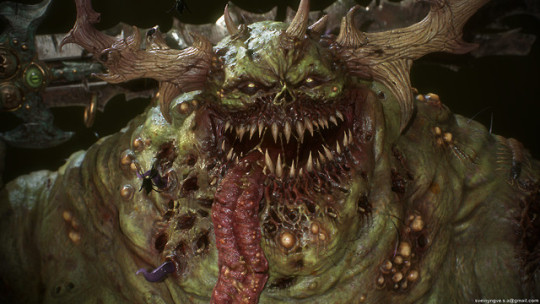
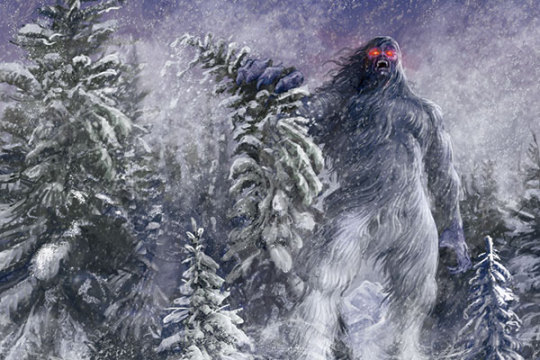
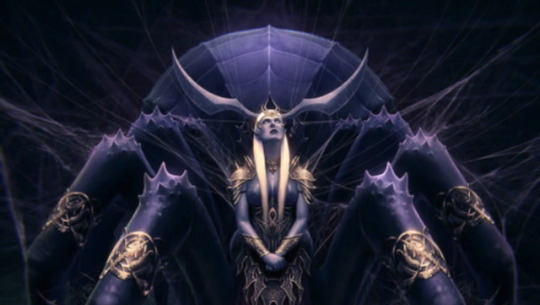
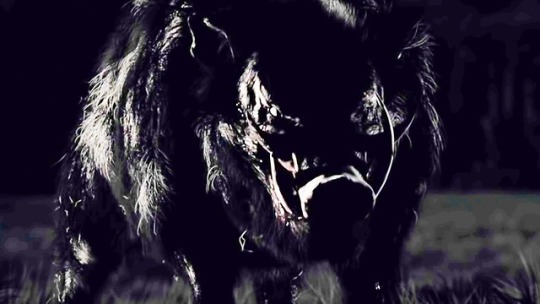
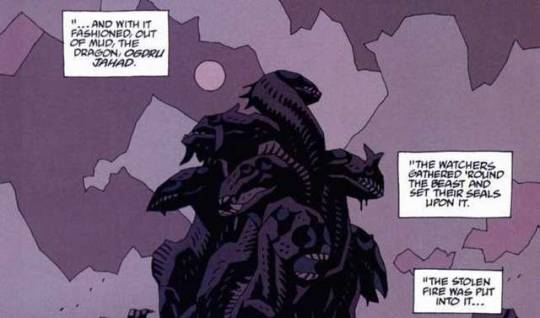
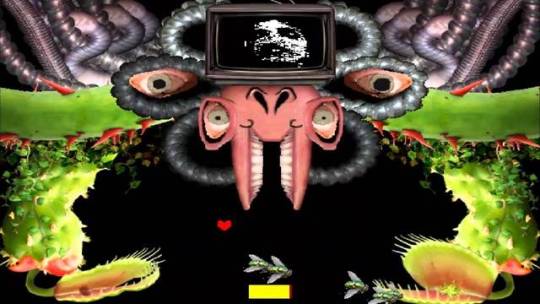
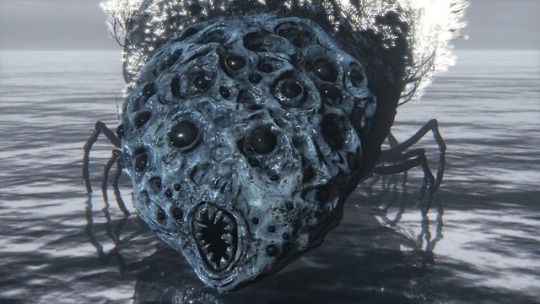
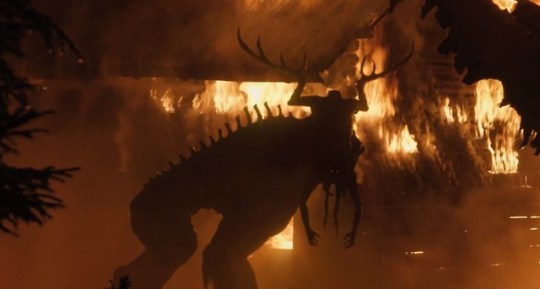
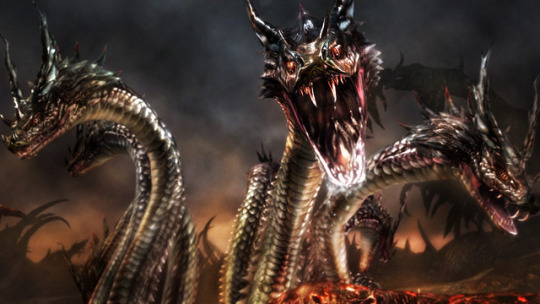
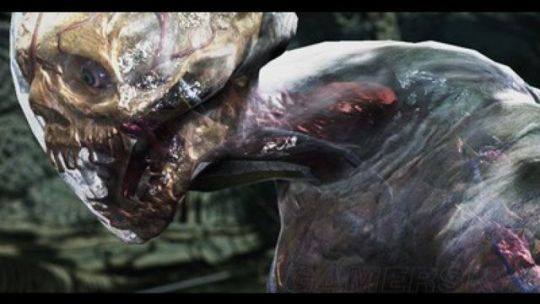
30 Day Monster Challenge 2 - Day #15: Favorite Great Old One/Monster God
1. Nurgle the Great Unclean One (Warhammer)
I think you can tell a lot about a person by knowing which of the Chaos Gods is there favorite. I’m not saying there’s a right answer, but I’ve always been a Nurgle man myself. Nurgle is more than just the daemon god of disease and entropy; he’s the god of the value of life. Nurgle loves all of his children equally, down to the smallest virus. It can be hard for people to accept that, to realize that they have as much cosmic significance as a single-cell organism, but that’s just because they don’t realize how much love the Urfather has for that little cell. In Nurgle’s phlegmatic embrace, all of us are equal, regardless of race, gender, or cell count.
Nurgle asks only that you spread the love he has so willingly given, so that all may be his children. Death and disease are natural parts of life; we struggle to fight them so, but they always come back to us. Through Nurgle, we may exalt in the power of pus and the greatness gangrene. We grow stronger with each infection, and every tumor is a sign of endurance. We do not die when the Plague Bearer calls us; we merely transform for the vermin and bacteria that consumes us, to be reborn in the eternal cycle. Truly, Grandfather Nurgle moves in wondrous ways.
2. Ithaqua the Wind Walker (August Derleth)
It should come as no surprise that the god of all wendigos is one of my favorite Great Old Ones. The Ithaqua Cycle is probably the best thing August Derleth wrote, for what ever that’s worth. Ithaqua is just such a chilling god; the image of some skull-faced giant thing turning around a mountain is the stuff of nightmares. Ithaqua is the primal urge inside life, the need to do anything to survive in an unrelenting environment. He walks in the cold places of the world, but also in that cold space between worlds, spreading his cannibalistic madness from world to world. Ithaqua himself seems hardly necessary, or the countless wendigos that follow him. It’s the chaos and horror he causes between people in a desperate situation, pitting one man against the other and breaking taboos until only the strongest is left. Ithaqua is the cold and brutality of the North personified.
3. Lolth the Queen of the Demonweb Pits (Dungeons and Dragons)
Lilith is so pastiche these days. You know where the real rebellious queen of evil action is at? Spiders, man, and Lolth is the Spider Queen. Lolth has been in Dungeons and Dragons since the beginning. Wherever the dark elves go, Lolth goes too, like any deity, and her absence from a setting is noticeable. She’s one of D&D’s greatest villains, and countless adventurers have lost their lives in the Demonweb Pits. Her entire realm is an arachnid hell crawling with spiders as small a mite to as big as her spider-golem palace. Lolth is an entity of contrasts; her priesthood is a strict matriarchy, but Lolth herself is absolutely insane. It’s hard to tell if there’s anything left of the elf goddess she used to be. Beneath the layers of scheming, beauty, racially motivated hatred, and plans to conquer the known multiverse lies a beating heart of blind hunger, an overwhelming instinct to survive by strength alone.
4. Saaitii the Hog (William Hope Hodgson)
Saaitii is actually what got this particular entry in the challenge. See, I wanted to do just ‘Top 10 Great Old Ones’, but then I was worried that not everybody would know what the Great Old Ones are and it’s kind of an arbitrary category that Lovecraft wanted people to change from story-to-story for fun, so then I just broadened the category to ‘monster gods’ and now here we are. Anyway, Saaitii is a monster that William Hope Hodgson’s occult detective Thomas Carnacki encountered in his monster-hunting stories. The locals tell Carnacki that Saaitii is the ghost of a boar wrongfully killed long ago, but Carnacki suspects that it’s an extradimensional something using the spirits of dead hogs to try and come through.
First off, I just want to know what William Hope Hodgson’s deal with pigs was. This is explicitly his second pig monster story, following the pig men from The House on the Borderlands. But the usage of that aesthetic is definitely refreshing a little unsettling. In an age of meme-tentacles, we need new and different cosmic horrors. Pigs can be disturbing; we think of them as cute at best and filthy at worst, but rarely evil or malevolent. Even the meanest boar has a kind of nobility to it. But the Hog brings up images of mindless, vicious cruelty, dark things in the forest and filth. The concept of a higher life form like some extradimensional whatsit coming into our world through ‘lower’ lifeforms strikes a little close to the karmic bullseye for some, turning the tables on humanity and reminding us that in the eyes of the cosmos, we’re just so much more food.
5. Ogdru Jahad the Seven Who Are One (Hellboy)
You’d think there’d be more dragons on the list, but so far it’s just the one. Seven. 369. Whatever. The Ogdru Jahad are the Hellboy/BPRD universes Great Old Ones, and the source of… a sizable amount of trouble there. Not all of it, but most of it. At the dawn of time, the Sons of God formed the mud of creation into seven great dragons that were filled with the shadow of the moon, for whatever reason. Things would have been fine and dandy there, but one little angel named Satan, for reasons that are still unclear, took the fire of God and filled the dragon with it, giving the Ogdru Jahad life. The Ogdru Jahad birthed their 369 offspring, and the angels had to fight them off before the whole Creation thing could get rolling. From that day on, every human culture has been warned about the Ogdru Jahad, and they have been ingrained in the human consciousness as the Dragon, from Tiamat to the Beast of Revelations.
It’s a nice fusion of Judeo-Christian Biblical lore and cosmic horror. I honestly don’t think it would work if it wasn’t for the fact that Satan is notably absent from the Hellboy series and, as of BPRD: Hell on Earth, the Ogdru Jahad are winning, where even their smallest children can cause natural disasters. I love conflating the image of dragons with cosmic monsters. Cthulhu as Leviathan, flying polyps as oriental dragons, hunting horrors as wyverns; it’s a direct play to the archetype that both types of creatures fill. The Ogdru Jahad illustrate that perfectly, simultaneously something the most modern of cosmic horror and the most ancient of monsters.
6. Flowey the Flower (Undertale)
Flowey’s final form gets in on design alone. There aren’t a lot of monster designs that actually freak me out, but Flowey is just horrible. Of course that’s also because it’s a genius bit of sprite animation, with the usage of textures contrasting so hard with the rest of Undertale. It looks like something that ate its way inside out from at least three Madoka witches. The claws, the eyes, the mouths; it all makes something perfectly awful and abhorrent. And, of course, the music. I actually think Flowey’s boss theme rates pretty low compared to other Undertale boss themes, but the title is just something else. How are you supposed to do better than “Your Best Nightmare”?
7. Rom the Vacuous Spider (Bloodborne)
It’s Rom. C’mon. Look, I know she’s not actually a Great One; she’s Kin, like Mergo’s Wet Nurse. But look at her. When I think, “What’s my favorite eldritch monstrosity boss from Bloodborne?” I keep coming back to Rom. Just look at her dumb, stupid face. One of her attacks is just falling over. That’s the most relatable a video game has been for me since I was an undergrad. Rom doesn’t want to hurt anybody; she’s just a giant, stupid bug/fungus thing. You could just walk away, man. You could just leave poor Rom alone. She’s doing her best trying to grant people eyes and you’re over here hassling her. In front of her kids, man. Just leave her alone.
8. Moder the Bastard of Loki (The Ritual)
Y’know, as a jotun, this guy could have been on the giant list, but I feel like its design and concept are too unique for that. This is a special monster, a kind of revelatory creature. Its design is just out of this world, blending human and stag and those creepy little eyes. But there’s so much more to it than just a great design. Its ability to create illusions essentially gives it access to shapeshifting, tying it to the actual mythology of Loki and Norse giants. The actual ritual to appease Moder, where it picks a person up and impales them on a tree, is reminiscent of the story in Norse mythology where Odin impales himself on the World Tree Yggdrasil to gain the knowledge of the runes. Before a person is killed, Moder shows them something precious to them, or a defining moment in their life; it is, in its own way, giving the person a revelation about what is vital in their own universe. Moder, like any good monster, delivers a message about the meaning of reality to the people it encounters.
9. Set the Slithering God (Conan the Barbarian/Marvel Comics)
I like this comic book version of a god. The actual Egyptian deity Set is fairly complex, and actually examining his character and divine portfolio gives insight into how Egypt’s culture changes over time. Comic book Set, on the other hand, is the god of snake villains. He is the snake villain to end all snake villains. Marvel cooked him up for their old Conan comics based off an offhand mention in one of Robert E. Howard’s stories because they needed Conan to have a nemesis. So Conan’s nemesis, the arch-wizard/priest Thoth Amon, worships the dark god Set, regardless of the fact that Thoth Amon appeared exactly once in the very first Conan story. Now, it’s fifty years later and Set is apparently one of Marvel’s Primordial Ultra-Deities.
It’s that mixture of traditional myth and the cosmic I like again, though this time it’s less H.P. Lovecraft ‘cosmic horror’ and more Jack Kirby ‘cosmic action’; new gods and a new mythology for a new medium, but still the same old story. Set is the Serpent, like the Ogdru Jahad, manifesting in human lore as everything from the serpent in Eden to Leviathan. He was the first murderer, able to absorb the power of any other god he ate, and even today he seeks reptile supremacy. Wherever there is Set there are snakes, enacting the cosmic cycle of death and rebirth while lounging in decadence.
10. Haos the Ultimate Bio-Weapon (Resident Evil 6)
… We’re going to do this now, and then we’re never going to do it again. Because we’re going to talk about something good that was in Resident Evil 6. One of the most infuriating things about RE6 is that it had some of the most incredible monster designs in the Resident Evil series. Great designs. The kind of monster designs that other games only wish they could achieve. And they were wasted on one of the worst games the series has produced. One of those designs was Haos, the apparent ultimate bio-weapon engineered by (ugh) Neo-Umbrella in a secret facility at the bottom of the ocean good lord I’m putting this on a list with William Hope Hodgson.
Haos deserves a better game; its design is unnecessarily fantastic. It looks like a ningen crossed with a jellyfish. It’s some far future stage of human evolution driven to its most extreme and bizarre form. There’s something forlorn and sad about it, but also beautiful and powerful. Its concept is purely apocalyptic; Haos will rise from the bottom of the ocean before it finally dies and dissolves into a gas that will spread across the world, turning humanity into zombies and monsters. Herald of a world of gods and monsters and all that. Even its name is kind of cool; ‘Haos’ is literally Siberian for ‘chaos’. And every day I have to wake up with the knowledge that this wonderful, horrible monster was stuck at the end of a Resident Evil 6 campaign. It’s depressing. So here’s to good old Haos; at least here you’ll get some respect.
#30 Day Monster Challenge 2#30 Day Monster Challenge#Great Old Ones#Warhammer#Nurgle#Dungeons and Dragons#Lolth#Hellboy#Undertale#long post
101 notes
·
View notes
Text
I am really tired of Conservatives being hypocrites strutting around acting like their side has done no wrong.
2 notes
·
View notes
Text
[Contain IW spoiler] a Thorki fans perspective (basically I am whining )
I just finished watching IW.
(The following rant post contains spoilers, a lot. Sorry, please leave before we push you to this abyss)
To a certain extent I was grateful that I got spoilered (on Loki' s storyline )by accident, thanks to a certain fan comic posted on Tumblr. I thought I was ready for it (actually no, my heart is still hurt) but anyway...THE MAIN POINT IS, I think this is the most canon THORKI moment I have ever imagined to get from MCU so far.
I never expect Loki to show such deep emotion of protecting his brother. Okay, the fandom has summarized a lot of previous Thorki moments in TDW about how they saved each other, but nothing can beat this: they realised it could be their last time to see their loved ones:
1. At first, Loki tried to pull off his typical side-switching bluffing technique when Thanos threatened to kill Thor. But he definitely choked (bad choice of word here) back tears when he saw Thor was being tortured. (Thank you Tom for his acting skills, my baby is crying omg) Even my friend (who always denies the existence of any Yaoi ships) said, "alright he definitely loves his brother...Based on Thor 1 or Avengers 1, I thought he would enjoy seeing Thor suffer in pain for a little longer.. " We (fangirls) all know our baby is a tsundere when it comes to his shinny big brother. And his "I promise you, brother, the sun will shine on us again" is the sweetest thing he could say to Thor at that time. His claim of being Odin's son (with a pause that looks into Thor's direction if I remember correctly ) is another attempt to comfort Thor. (I think he is yelling "trust me brother I want to save you I love you I can't bear to see you getting hurt " internally )
I will live on any resurrection / reborn fanfics in the next 10 months for my shipper' s heart.


2. Thor has to watch his love dying / being murdered in front of him while he could do absolutely nothing. Some people (again, my anti-fandom/fandom existence-denial friends) argued right away that his anger was largely due to the loss of his people including Heimdall and not just because of Loki. Oh really? I mean, yes and no: yes he is FURIOUS when the enemies committed genocide to his people but Loki's death is not as significant as we "imagined"? Hold on there buddy, I think his chitchat with "Rabbit" Rocket explained everything. He was definitely mourning for the loss of Loki. As another Tumblr post mentioned, his strong will of seeking revenge is triggered by the death of Loki. The way he struggled to reach Loki' s body (by the way that's not how I want to see Jotun Loki damn you MCU you are like a drunk Santa Claus that gives dead rat to fulfill a child's wish of getting a pet Mickey ) before the explosion, the way he cried in agony when Loki fell on the floor (there are a few close up on Thor's face as if the whole scene is not heart breaking enough)....and he basically keep this rage til the very end of the movie. It's a cliche of "you never know how much you love someone until you loss him/her".
That's why I feel like everything he did in the movie was an attempt to sucide. He jumped into the machine for the creation of a new weapon like "I don't care if I die I have nothing to loss anyway . if i live, i will seek revenge, and if i die, i will be with my family" . It's heart breaking.

3. (Not exactly about Thorki) I am also a fans of Stucky. So yes, double strike to my shipper's heart when I see Steve touched the ground after Bucky turned into ashes. And basically every canon / non-canon ships are wrecked in the movie. (And this atrocity start from Thorki as if they know it's my fucking OTP) MCU you are evil damn you. At certain point I just feel numb sitting in the cinema witnessing the ships being destroyed one by one

4. Basically, Thanos started a revolution to create a world full of wrecked ships by killing canon or potential couples. It's a shitty plan, Thanos. That's not how you should spend your wish fuck you. No wonder you are forever alone. (A world full of crack ships!!!!!!!! Roarrrrr) and don't act like you are being forced to kill your adopted daughter and you lost everything. You bastard

Anyway, forgive me for posting this. Thank you for your patience to read through my rants. I honestly feel that Loki' s storyline would not end this way and I can't way to see how Avengers 4 will save the plot from here. But before I move to the serious movie plot discussion, let's just say I expect to see more fanfic in AO3 as I need to nourish my Thorki shipper's body mind and soul in a desperate manner. Please let me know I am not the only one feeling this way after watching IW....(crawling back to the corner and cry).
#thorki#infinity war spoilers#thor#thor ordinson#loki#loki laufeyson#stucky#steve rogers#bucky barnes#i am still not over it#thor x loki#how many ships can be destroyed in one movie
356 notes
·
View notes
Note
lbh no one would be defending loki if he wasn't played by a semi-attractive british guy
This is true. But also, let me be clear! Loki is awesome!!! He’s a great character! Thor 2, it’s all Loki and it’s the best! I am so pumped for Thor 3 and to see what sort of antics they’ve got planned. Loki is awesome in the way Darth Vader is awesome. They’re great villains. They’re badass and you love to watch them be badass. Yeah, Loki’s backstory is relatable and interesting. Bad things happened to him, and it absolutely sucks that we don’t really see Odin pay for this. (When does Odin ever, tbh.) The difference between my tragic backstory, your tragic backstory, any of us and Loki, is that we didn’t decide the best course of action was MURDER. And yeah, Loki’s one of the most fun characters in the movies and the comics because he always ALMOST makes the right choice. He’ll do the right thing for awhile, and then lose the plot again. The audience knows he has the capacity to do good, which makes watching him so entertaining. We’re invested in will he actually do it this time. Then he betrays everyone and is a total evil bastard and it’s AWESOME. I relish when he’s the hero, I relish when he’s the villain. But he’s not a good guy.Also, side note, google anti hero?!??! Come on ya’ll.
1 note
·
View note
Text
Book Rant: A Kiss Before the Apocalypse
Gods this book is so fucking amateurish I can’t believe it was published. There’s just some basic fucking shit that’s gotten wrong here.
I legitimately thought it was written by a teenager but the author was about 45 when he wrote it.
Case in point: Final battle with good vs evil with about three?? It’s not clear?? Nasty Seraphim guys and then-
‘Francis threw himself into the fray with little hesitation, his blade thrust deflected by Zophiel’s own.’
Who is Zophiel?? Zophiel has not been introduced! You can't just POOF new characters in and expect me to follow? I mean I'm GUESSING it's another of the seraphim but for FUCKS SAKES.This is the goddamn CLIMAX. Who the fuck is Zophiel??? He could be a goddamn SEA CUCUMBER for all I know!
Just. Basic. Fucking. Stuff.
Oh and there is an ally who is just magically working for the bad guys now despite there being no narrative hint that this was the case. He just ditched them and Remy’s like ‘oh he must be a bad guy.’ and is all sad and
what????
Oh and apparently disabled people have the ability to sense angels because that’s not shitty at all and the angels in general despise humanity and kickstarted the apocalypse out of jealousy which is kind of exactly what Lucifer did and good luck when Dad comes home and sees the mess you’ve made.
There’s so much about this world that isn’t clear. Shit is referred to but never clarified. Apparently Pandemonium is an apartment for souls trying to redeem themselves rather than Lucifer’s house in hell and gah.
Who are Galgaliel and Haniel??? FUCK ME.
Also there are thousands of angels - where the fuck are they all?
Oh and now the Grigori just... show up? Because Francis talked to them offscreen??
Fucking hell. Show, don’t tell.
... did he-
He did.
‘The final member of the three sized him up. It switched a short sword from one hand to the other as it eyed him, a charred lip raised in a snarl to reveal teeth like blackened corn. Finding that he had a limited reserve of patience, Francis simply pulled the gun from his waist-band and shot the creature in the face, satisfied to waste a bullet if only to move things along.’
*NERD RAGE INTENSIFIES*
Okay. Okay let me break this down.
The reason that scene in Indiana Jones was funny was because it was unexpected. Indy had not been using his gun through the battle and had been making use of the terrain and circumstances to take his enemies down. The fact he pulled the gun after a flashy sword display was funny because the audience had forgotten it was there.
You. On the other hand. Used it one paragraph ago.
‘Not to waste anymore valuable ammunition, he stuck the gun in the waistband of his slacks and decided to deal with the abominations old school.’
He dispatches a total of two enemies before drawing the gun again.
Pacing you fuck. Comedic timing.
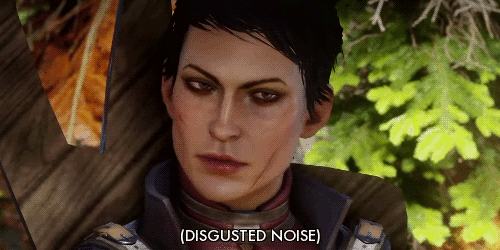
And in the previous page Francis actually said he didn’t mind using up those super special bullets. Maybe if he had been conservative from the beginning he wouldn’t be out now.
Plus this ‘battle’ still feels like it’s taking place between about ten people.
Also. Death is a wimp. You can’t deal with life because it hurts a bit? Fucking hell you’d think an ancient being would be experienced with this shit, immortal or no.
Also also. Scrolls? With permission from god to end the world? Is this an actual thing? Very poor planning on His part if just anyone can break them open.
Also also also, Remy if your goddamn wife is dying anyways just take her with you so you can hold her fucking hand while she dies you prick.
Also also also also, it’s implied that Remy is only holding back the apocalypse to let his wife die in peace. Well you’re an arsehole. Some heavenly being you are.
So the bad guy flew Remy up super high and let go
WAIT.
REMY CAN DIE FROM FALL DAMAGE???
BUT NOTHING CAN DIE AT THE MOMENT??? BECAUSE DEATH ISN’T DOING HIS JOB??? WHICH IS THE WHOLE PLOT??
CONSISTENCY DAMMIT.
And I’m pretty sure All-Father is Odin’s title. Not God’s.
And Fallen Angel blood is suddenly acidic toward Angels even though two pages ago it ‘all smelled the same.’
Ugh. This book is a mess. Who edited this shit heap?
Oh gods just end already. There are several points in this climax where the little epiphany on how to fix everything pops up, only to be smashed down. Then there’s a new one ect ect and it just goes on and on.
Asrafil leaves the body he’s been possessing and apparently the poor bastard who owns it is still there.
You absolute prick. You couldn’t just remove the soul and let the poor bastard rest?
So Remy lends his ... body? To Asrafil so they can go on with reaping souls. Don’t ask me how that works. And of course one of them is his wife and
‘It sang of a life filled with accomplishment and the sweetest of loves between man and woman.’
Oh gag spare me your heteronormative ‘man and woman’ shit.
And why would Lazarus be guilty over what he’s done? Why would the guilt be painful for him? He’s not an angel. Just an immortal human.
Oh and now some of the big angels come to say ‘thanks for saving the world, bye.’
You know mister Author I’d care a lot more about Maddie, the wife, if she was allowed to be a fucking character rather than just a Sad Plot Device.
And there’s an epilogue. You have not earned it.
Do they even let dogs in graveyards? I don’t see why not I suppose.
The dog says that Madeline isn’t buried there because she’s with them and Remy doesn’t understand and you’re a bit of a clod for an Angel. Gods.
Wait the dog doesn’t think Maddie is gone now because of her smell on his toys and bed. But the dog was mourning her absence from the house when she was in the hospital why is it suddenly different when she’s dead???
Once more: Where do the dead go when they die???? She’s apparently there in all the life around them rather than you know, Heaven.
Fuck me it’s over. UGH.
FINAL PLOT HOLE:
The evil seraphim guys were the ones wanting to find Asrafil and end the world with the scrolls. But their allies, the demon dudes, tried to stop Remy from finding him.
SENSE????
How can ‘Detective who used to be an Angel’ be so fucking boring and ridiculous
tl;dr - Don’t waste your time with this crap. Go read Good Omens.
#Remy Chandler#GODS this fucking book#IT"S OVER#ARGGGG#books#a kiss before the apocalypse#remy#chandler#apocalypse
0 notes